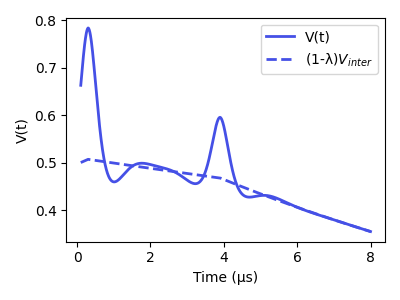Note
Go to the end to download the full example code.
Simulating a 5-pulse DEER signal¶
An example on how to simulate a 5-pulse DEER dipolar signal containing the two main dipolar pathway contributions, using a Gaussian distance distribution.
# Import the required libraries
import numpy as np
import matplotlib.pyplot as plt
import deerlab as dl
# Simulation parameters
tau1, tau2, tau3 = 3.5, 4.2, 0.3 # Inter-pulse delays, μs
Δt = 0.008 # Time increment, μs
tmin = 0.1 # Start time, μs
rmean = 4.0 # Mean distance, nm
rstd = 0.4 # Distance standard deviation, nm
rmin, rmax = 1.5, 6 # Range of the distance axis, nm
Δr = 0.05 # Distance resolution, nm
conc = 150 # Spin concentration, μM
lam1 = 0.30 # Amplitude of dipolar pathway refocusing at t=tau3
lam2 = 0.15 # Amplitude of dipolar pathway refocusing at t=tau2
V0 = 1 # Overall echo amplitude
# Time vector
tmax = tau1+tau2+tau3
t = np.arange(tmin, tmax, Δt)
# Distance vector
r = np.arange(rmin, rmax, Δr)
experiment = dl.ex_rev5pdeer(tau1, tau2, tau3, pathways=[1,2])
reftime1, reftime2 = experiment.reftimes(tau1, tau2, tau3)
# Construct the dipolar signal model
Vmodel = dl.dipolarmodel(t, r, Pmodel=dl.dd_gauss, experiment=experiment)
# Simulate the signal with orientation selection
Vsim = Vmodel(mean=rmean, std=rstd, conc=conc, scale=V0, lam1=lam1, lam2=lam2, reftime1=reftime1, reftime2=reftime2)
# Scaled background (for plotting)
Vinter = V0*(1-lam1-lam2)*dl.bg_hom3d(t-reftime1,conc,lam1)*dl.bg_hom3d(t-reftime2,conc,lam2)
# Plot the simulated signal
violet = '#4550e6'
plt.figure(figsize=[4,3])
plt.plot(t, Vsim, lw=2, label='V(t)', color=violet)
plt.plot(t, Vinter, '--', color=violet, lw=2, label='(1-λ)$V_{inter}$')
plt.legend()
plt.xlabel('Time (μs)')
plt.ylabel('V(t)')
plt.tight_layout()
plt.show()

Total running time of the script: (0 minutes 0.142 seconds)